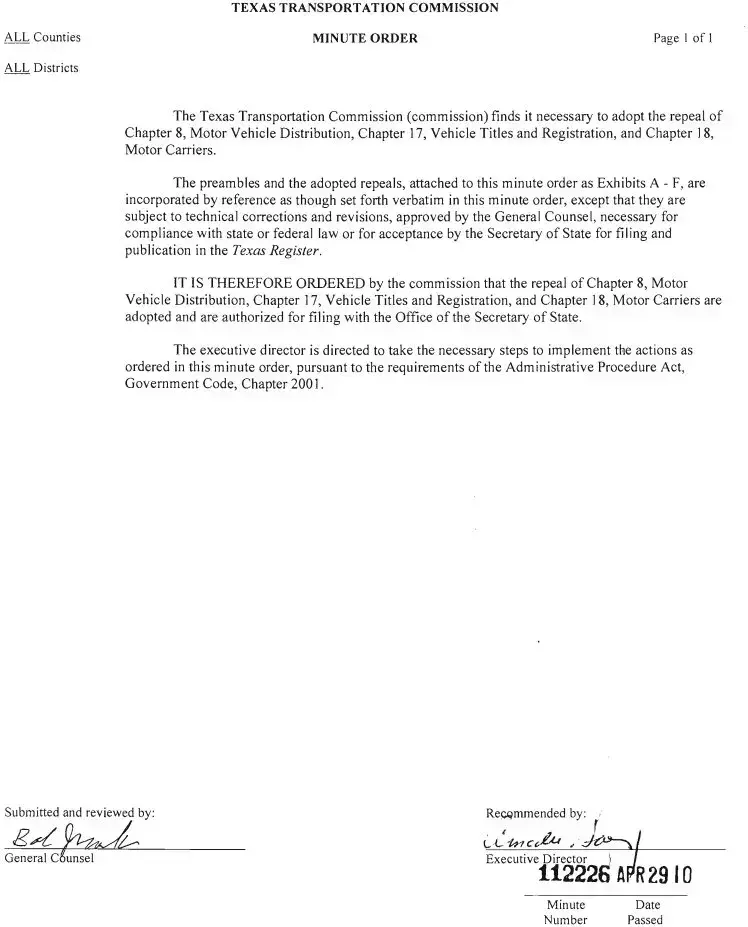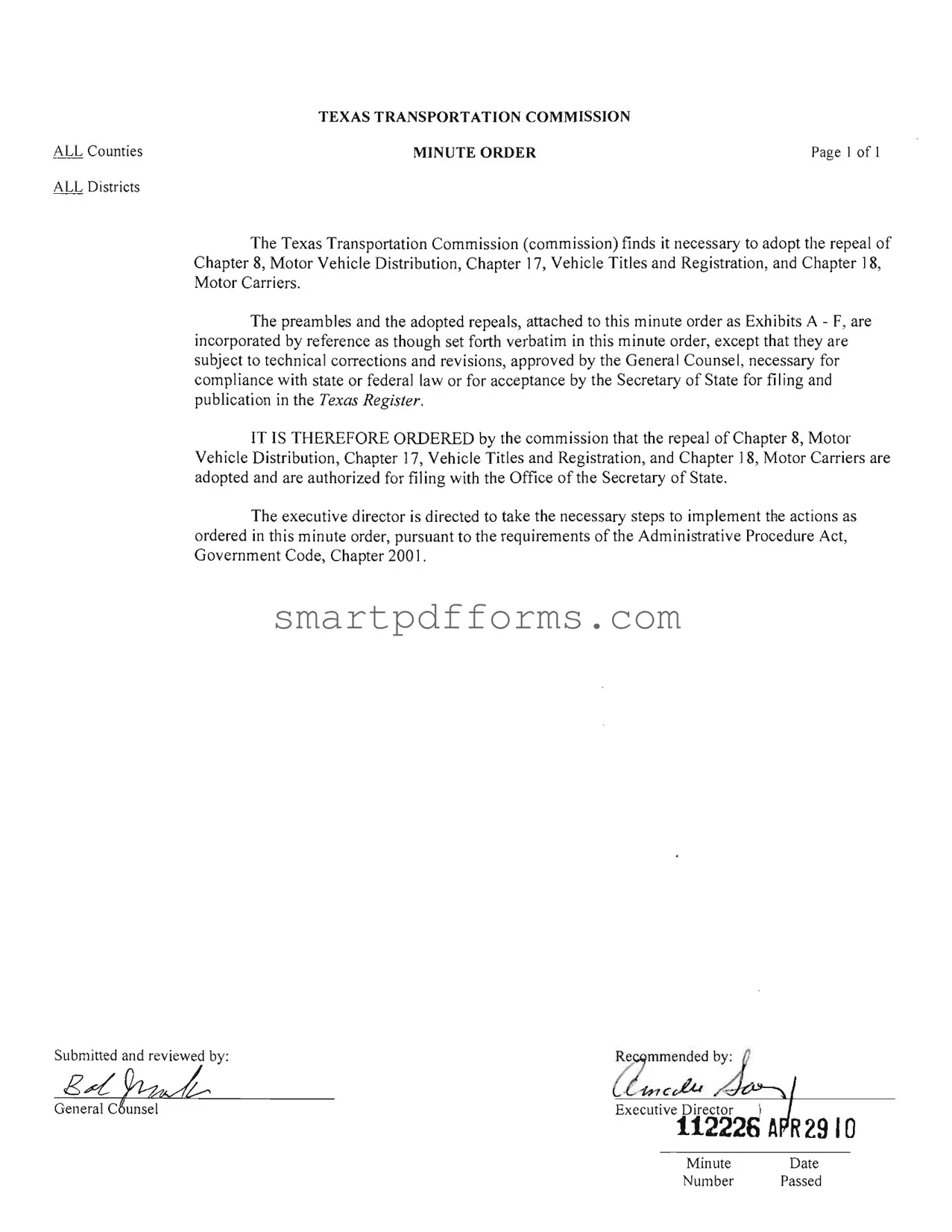Blank Texas Temporary Tags PDF Template
In an effort to streamline and improve the regulatory framework governing motor vehicle distribution and management in Texas, the Texas Transportation Commission has undertaken significant legislative and procedural changes. These changes, detailed in a minute order, encompass the repeal of various chapters and sections that previously dictated the operations of motor vehicle dealers, manufacturers, distributors, converters, representatives, lessors, and lease facilitators under the statutes of the Occupations Code, Chapter 2301, and the Transportation Code, Chapter 503. This comprehensive overhaul, directed by the commission, was prompted by the adoption of House Bill No. 3097 during the 2009 Regular Session of the legislature. This bill effectively created the Texas Department of Motor Vehicles (DMV), to which the duties and powers related to vehicle titles, registrations, and other motor vehicle regulatory functions were transferred. This transition aimed at facilitating a more efficient regulatory environment, abiding by the overarching goals of state and federal compliance, was achieved without public objection, as indicated by the absence of comments on the proposed repeals. Thereby, this step marks a pivotal shift in the regulation of motor vehicle distribution in Texas, setting the stage for improved governance under the auspices of the newly established DMV, in line with the legislative mandates and the Texas Transportation Commission's strategic objectives.
Preview - Texas Temporary Tags Form

|
TEXAS TRANSPORTATION COMMISSION |
|
ALL Counties |
MINUTE ORDER |
Page 1 of 1 |
ALL Districts
The Texas Transportation Commission (commission) finds it necessary to adopt the repeal of Chapter 8, Motor Vehicle Distribution, Chapter 17, Vehicle Titles and Registration, and Chapter 18, Motor Carriers.
The preambles and the adopted repeals, attached to this minute order as Exhibits A - F, are incorporated by reference as though set forth verbatim in this minute order, except that they are subject to technical corrections and revisions, approved by the General Counsel, necessary for compliance with state or federal law or for acceptance by the Secretary of State for filing and publication in the Texas Register.
IT IS THEREFORE ORDERED by the commission that the repeal of Chapter 8, Motor Vehicle Distribution, Chapter 17, Vehicle Titles and Registration, and Chapter 18, Motor Carriers are adopted and are authorized for filing with the Office of the Secretary of State.
The executive director is directed to take the necessary steps to implement the actions as ordered in this minute order, pursuant to the requirements of the Administrative Procedure Act, Government Code, Chapter 2001.
Submitted and reviewed by: |
|
Recommended by: |
|
|
|
|
|
|
|
|
|
General Counsel |
Executive Director |
|
|
||
|
|
|
|
|
|
|
|
|
Minute |
Date |
|
|
|
|
Number |
Passed |
|
Texas |
Department of Transportation |
Page 1 of 2 |
Motor |
Vehicle Distribution |
|
1 |
Adoption Preamble |
2The Texas Department of Transportation (department) adopts the
3 repeal of §§8.1 - 8.6, 8.21 - 8.58, 8.81 - 8.88, 8.101 - 8.114, 4 8.131 - 8.160, 8.171 - 8.181, 8.201 - 8.210, 8.241 - 8.271, and 5 8.301 - 8.317, all concerning 43 TAC Chapter 8, Motor Vehicle 6 Distribution. The repeal of §§8.1 - 8.6, 8.21 - 8.58, 8.81 - 7 8.88, 8.101 - 8.114, 8.131 - 8.160, 8.171 - 8.181, 8.201 -
8 8.210, 8.241 - 8.271, and 8.301 - 8.317 are adopted without
9 changes to the proposed text as published in the March 12, 2010
10issue of the Texas Register (35 TexReg 2131) and will not be
11republished.
12
13EXPLANATION OF ADOPTED REPEALS
14The legislature at its 2009 Regular Session enacted House Bill
15No. 3097, which created the Texas Department of Motor Vehicles
16(DMV) and transferred to the DMV the powers, duties,
17obligations, and rights of action of the department's vehicle
18titles and registration division and motor vehicle division, the
19Automobile Burglary Theft Prevention Authority, and the part of
20the department's motor carrier division responsible for motor
21carrier registration and the enforcement of Transportation Code,
22Subtitle F, Title 7, which relates to the regulation of vehicles
23and traffic. The legislation transferred the rules of the Texas
24Transportation Commission (commission) related to those powers,
25duties, obligations, and rights of action to the governing board
OGC: 04/13/10 12:15 PM |
Exhibit A |
Texas |
Department of Transportation |
Page 2 of 2 |
Motor |
Vehicle Distribution |
|
1of the DMV effective November 1, 2009.
2
3 The repeal of Chapter 8, Motor Vehicle Distribution, removes the 4 sections that previously regulated motor vehicle dealers,
5 manufacturers, distributors, converters, representatives,
6 lessors, and lease facilitators, in accordance with Occupations 7 Code, Chapter 2301, and Transportation Code, Chapter 503. The 8 regulation of those entities will be under the DMV rules
9 contained in 43 TAC Chapter 215, Motor Vehicle Distribution,
10which were adopted by the Board of the Texas Department of Motor
11Vehicles in January 2010.
12
13COMMENTS
14No comments on the proposed repeals were received.
16STATUTORY AUTHORITY
17The repeals are adopted under Transportation Code, §201.101,
18which provides the commission with the authority to establish
19rules for the conduct of the work of the department.
21CROSS REFERENCE TO STATUTE
22None.
OGC: 04/13/10 12:15 PM |
Exhibit A |

|
Texas Department of Transportation |
Page 1 of 9 |
|
Motor Vehicle Distribution |
|
1 |
CHAPTER 8. MOTOR VEHICLE DISTRIBUTION |
|
2SUBCHAPTER A. GENERAL PROVISIONS
3 §8.1 Scope and Purpose
4§8.2 Definitions; Conformity with Statutory Requirements
5§8.3 Duties and Powers of Director
6 §8.4 Formal Opinions
7 §8.5 Informal Opinions
8 §8.6 Exempted Actions
9
10 |
SUBCHAPTER B. ADJUDICATIVE PRACTICE AND PROCEDURE |
||
11 |
§8.21 |
Objective |
|
12 |
§8.22 |
Prohibited Disclosures and Communications |
|
13 |
§8.23 |
Appearances |
|
14 |
§8.24 |
Petitions |
|
15 |
§8.25 |
Affidavits |
|
16 |
§8.26 |
Form of Petitions, Pleadings, and the Like |
|
17 |
§8.27 |
Complaints |
|
18 |
§8.28 |
Docket |
|
19 |
§8.29 |
Computing |
Time |
20 |
§8.30 |
Filing of |
Documents |
21 |
§8.31 |
Cease and |
Desist Orders |
22 |
§8.32 |
Enlargement of Time |
|
23 |
§8.33 |
Expenses of Witness or Deponent |
|
|
NOTE: |
Repeals |
Exhibit B |
|
OGC: |
04/13/10 12:16 |
PM |

Texas |
Department of Transportation |
Page 2 of 9 |
Motor |
Vehicle Distribution |
|
1 §8.34 Institution of Adjudicative Proceedings
2§8.35 Notice of Hearing in Adjudicative Proceedings
3 |
§8.36 |
Reply |
4 |
§8.37 |
Hearings To Be Public |
5§8.38 Recording and Transcriptions of Hearing Cost
6 |
§8.39 |
Joint Record |
7 |
§8.40 |
Waiver of Hearing |
8 |
§8.41 |
Postponement of Hearing |
9 |
§8.42 |
Presiding Officials |
10 |
§8.43 |
Conduct of Hearing |
11 |
§8.44 |
Conduct and Decorum |
12 |
§8.45 |
Evidence |
13 |
§8.46 |
Stipulation of Evidence |
14 |
§8.47 |
Objections and Exceptions |
15 |
§8.48 |
Motions |
16 |
§8.49 |
Briefs |
17 |
§8.50 |
Service of Pleading, Petitions, Briefs, and the Like |
18 |
§8.51 |
Submission |
19§8.52 Findings and Recommendations of Hearing Officer
20§8.53 Filing of Exceptions
21§8.54 Form of Exceptions
22§8.55 Replies to Exceptions
23§8.56 Final Decision
NOTE: |
Repeals |
Exhibit B |
OGC: |
04/13/10 12:16 PM |
|

Texas |
Department of Transportation |
Page 3 of 9 |
Motor |
Vehicle Distribution |
|
1 §8.57 Submission of Amicus Briefs
2§8.58 Format for Documents Filed with the Director
3 Subsequent to the Issuance of a Proposal for Decision 4
5 SUBCHAPTER C. LICENSES, GENERALLY
6 §8.81 |
Objective |
7 §8.82 Administration of Licensing Fees
8 §8.83 Renewal of Licenses
9 §8.84 Brokering, New Motor Vehicles
10 §8.85 Brokering, Used Motor Vehicles
11§8.86 Processing of License Applications, Amendments, or
12Renewals
13§8.87 License Terms and Fees
14§8.88 Transition Period for the Issuance of
15Licenses
16
17SUBCHAPTER D. FRANCHISED DEALERS, MANUFACTURERS, DISTRIBUTORS,
18CONVERTERS AND REPRESENTATIVES
19 |
§8.101 |
Objectives |
|
20 |
§8.102 |
Representatives |
|
21 |
§8.103 |
|
|
22 |
§8.104 |
Amended License |
|
23 |
§8.105 |
Notification of License Application; Protest |
|
|
NOTE: Repeals |
Exhibit B |
|
|
OGC: |
04/13/10 12:16 PM |
|

Texas |
Department of Transportation |
Page 4 of 9 |
Motor |
Vehicle Distribution |
|
1Requirements
2§8.106 Time for Filing Protest
3 §8.107 |
Hearing |
4§8.108 Addition or Relocation of Line Make
5 §8.109 Replacement Dealership
6 §8.110 Franchise Verification
7§8.111 Notice of Termination or Noncontinuance of Franchise
8 and Time for Filing Protest
9§8.112 Motor Home Show Limitations and Restrictions
10§8.113 Manufacturer Ownership of Franchised Dealer; Good
11Cause Extension; Dealer Development
12§8.114 Sale of Vehicles by Manufacturer/Distributor at
13Wholesale Auction
14 |
|
|
15 |
SUBCHAPTER |
E. GENERAL DISTINGUISHING NUMBERS |
16 |
§8.131 |
Objective |
17 |
§8.132 |
Definitions |
18 |
§8.133 |
General Distinguishing Number |
19§8.134 House Trailer; Travel Trailer; Towable Recreational
20Vehicle
21§8.135 More than One Location
22§8.136
23§8.137 Security Requirements
NOTE: |
Repeals |
Exhibit B |
OGC: |
04/13/10 12:16 PM |
|

Texas |
Department of Transportation |
Page 5 of 9 |
Motor |
Vehicle Distribution |
|
1§8.138 Use of Metal Dealer License Plates
2 §8.139 Metal Dealer Plate Allocation
3§8.140 Established and Permanent Place of Business
4 §8.141 |
Sanctions |
5§8.142 GDN Sanction and Qualification Hearing
6 §8.143 Manufacturers License Plates
7§8.144 Record of Sales and Inventory
8 §8.145 Change of Dealer’s Status
9 §8.146 Metal Converter's License Plates.
10§8.147 Proof of Valid License Required of Foreign Motor
11Vehicle Dealers
12§8.148 Dealer Agents
13§8.149 Independent Mobility Motor Vehicle Dealers
14§8.150 Authorization to Issue Temporary Tags
15§8.151 Temporary Tags, General Use Requirements, and
16Prohibitions
17§8.152 Obtaining Numbers for Issuance of Temporary Tags
18§8.153 Specifications for All Temporary Tags
19§8.154 Dealer Temporary Tags
20§8.155 Buyer's Temporary Tags
21§8.156 Buyer's Temporary Tag Receipt and Notice to Buyer
22§8.157 Advance Numbers,
23§8.158 Advance Numbers, Emergency Buyer's Temporary Tags
NOTE: |
Repeals |
Exhibit B |
OGC: |
04/13/10 12:16 PM |
|

Texas |
Department of Transportation |
Page 6 of 9 |
Motor |
Vehicle Distribution |
|
1§8.159 General Requirements and Allocation of
2 and Emergency Buyer's Tag Numbers
3 §8.160 Converter's Temporary Tags
4
5 SUBCHAPTER F. LESSORS AND LEASE FACILITATORS
6 |
§8.171 |
Objective |
7 |
§8.172 |
Definitions |
8 |
§8.173 |
License |
9§8.174 Application for a License
10 §8.175 |
Sanctions |
11§8.176 More Than One Location
12§8.177 Established and Permanent Place of Business
13§8.178 Records of Leasing
14§8.179 Change of Lessor or Lease Facilitator Status
15§8.180 Required Notices to Lessees
16§8.181 General Distinguishing Number Exception
17
18 SUBCHAPTER G. WARRANTY PERFORMANCE OBLIGATIONS
19 §8.201 |
Objective |
20 §8.202 Filing of Complaints
21 §8.203 Review of Complaints
22§8.204 Notification to Manufacturer, Converter, or
23Distributor
NOTE: |
Repeals |
Exhibit B |
OGC: |
04/13/10 12:16 PM |
|
Form Data
| Fact Number | Description |
|---|---|
| 1 | The Texas Transportation Commission ordered the repeal of Chapters 8, 17, and 18 covering Motor Vehicle Distribution, Vehicle Titles and Registration, and Motor Carriers. |
| 2 | Repeals were incorporated with the option for technical corrections for compliance with state or federal law, or for acceptance by the Secretary of State. |
| 3 | The Executive Director of the Texas Department of Transportation is tasked with implementing the ordered actions. |
| 4 | House Bill No. 3097 in 2009 prompted the transfer of powers and duties to the newly created Texas DMV from the Texas Department of Transportation. |
| 5 | The repeal specifically removes regulations on motor vehicle dealers, manufacturers, distributors, and other related entities from Chapter 8. |
| 6 | Regulation of entities previously under Chapter 8 is now under the purview of the Texas DMV, according to DMV rules in 43 TAC Chapter 215. |
| 7 | No public comments were received on the proposed repeals. |
| 8 | The repeals are adopted under the authority of the Transportation Code, §201.101, which allows the commission to establish departmental rules. |
| 9 | There are no direct cross references to statutes provided in the document. |
| 10 | The previously existing chapters were regulated under the Occupations Code, Chapter 2301, and Transportation Code, Chapter 503. |
Instructions on Utilizing Texas Temporary Tags
Filling out forms can often feel like navigating through a maze, especially when it involves legal or regulatory matters. When it comes to matters related to vehicles, Texas has its specific requirements and procedures that residents need to follow. For people needing to obtain temporary tags for their vehicles, understanding the Texas Temporary Tags form is essential. Although the document provided does not directly detail the procedure for filling out a temporary tags form, it mentions significant changes in the administration and regulation of motor vehicle distribution and registration in Texas, now overseen by the Texas Department of Motor Vehicles (DMV). This shift implies that any form related to vehicle registration, including temporary tags, would now be processed under the guidelines set by the Texas DMV. Let's go through the steps you'd typically follow when filling out such a form:
- Locate the correct form on the Texas DMV website or visit your local county tax office to obtain a physical copy. The form is likely categorized under vehicle registration services.
- Start by reading the form thoroughly to understand all the requirements and gather the necessary information and documents before you begin filling it out.
- Fill in the vehicle's specific information, including make, model, year, vehicle identification number (VIN), and the vehicle's physical address.
- Provide the owner or lessee's information, including full name, valid driver’s license number, and address.
- If the temporary tag is for a dealer or manufacturer, ensure you include the business name, contact information, and dealer license number if applicable.
- Check the reason for the temporary tag application. This could include reasons such as a vehicle sold by a dealer awaiting permanent registration, private sale vehicle awaiting title transfer, or other valid reasons provided by the form.
- Include the issuance date of the temporary tag and the expiration date. Temporary tags typically have a set validity period mandated by the state.
- Review the form for any additional instructions or requirements specific to the type of temporary tag being applied for and ensure all the necessary documentation is attached. This may include proof of insurance, vehicle inspection reports, or sales documents.
- Sign and date the form, acknowledging the truthfulness and accuracy of the information provided. If applying in person, ensure you have identification with you.
- Submit the form either online, via mail, or in person at your local county tax office or through the Texas DMV's designated submission channels. Include any required fees associated with the temporary tag issuance.
After you've submitted the form, the next steps usually involve waiting for processing and the issuance of your temporary tag. The Texas DMV or your local county tax office should provide details on how and when you'll receive the temporary tag. This tag will allow you to operate the vehicle legally under the conditions specified until you can complete the process for permanent registration or resolve whatever situation necessitated the temporary tag. Always double-check with the latest Texas DMV guidelines or your local county tax office for any updates or changes to the process.
Obtain Answers on Texas Temporary Tags
What is the purpose of the Texas Temporary Tags form?
The Texas Temporary Tags form is part of the regulatory framework for motor vehicle distribution in the state. The main purpose of these tags is to allow drivers to legally operate their vehicles on public roads before obtaining permanent registration and license plates. Temporary tags are issued following the sale, lease, or rental of motor vehicles, including when vehicles are purchased through private sales. They serve as a bridge, ensuring all vehicles on the road are identified and accounted for, enhancing roadway safety and compliance with state laws.
How did recent legislative changes impact the regulation of motor vehicle distribution in Texas?
In 2009, House Bill No. 3097 significantly altered motor vehicle distribution regulation in Texas. This legislation led to the creation of the Texas Department of Motor Vehicles (DMV), transferring duties and powers from the Texas Department of Transportation’s Vehicle Titles and Registration Division and Motor Vehicle Division. As a result, the regulation of motor vehicle dealers, manufacturers, and other related entities transitioned to the DMV. This move not only streamlined regulation by centralizing authority but also ensured a more focused approach to the oversight of motor vehicle distribution within the state.
Are there any recent changes to the rules regarding motor vehicle distribution?
Yes, recent changes have been made to the rules that govern motor vehicle distribution. The repeal of several sections under Chapter 8, which concerned Motor Vehicle Distribution, marked these changes. The repealed sections dealt with the regulation of entities such as motor vehicle dealers, manufacturers, and lessors. The purpose of these repeals was to eliminate redundancy and confusion, as regulation of these entities has been transferred to the Texas Department of Motor Vehicles (DMV), under rules contained in 43 TAC Chapter 215. This regulatory shift, adopted by the Board of the Texas Department of Motor Vehicles in January 2010, streamlined the oversight and simplified the compliance process for those involved in motor vehicle distribution.
How can one obtain a Texas Temporary Tag?
To obtain a Texas Temporary Tag, individuals typically need to go through a vehicle dealer or the Texas Department of Motor Vehicles. During a vehicle purchase, the dealer will issue a temporary tag that allows the new owner to legally drive the vehicle while waiting for permanent registration. In instances where a transaction does not involve a dealer, such as a private sale, the buyer can directly approach the Texas DMV to request a temporary tag. Necessary documentation includes proof of vehicle purchase, a valid form of identification, and proof of insurance. It’s crucial to note that temporary tags have a finite validity period, usually 30 to 90 days, by the end of which the vehicle must be properly registered with the state.
Common mistakes
Filling out official forms, such as the Texas Temporary Tags form, requires attention to detail and an accurate representation of the necessary information. Even with the best of intentions, individuals can make several common mistakes during this process. It's essential to address and avoid these errors to ensure the process is completed successfully and without delay. Here are four common mistakes:
- Inaccurate Information: One of the most significant mistakes is entering incorrect information. This could be due to typos, old information that is no longer accurate, or misunderstanding what is being asked for on the form. It is vital to double-check all entries against official documents to verify accuracy.
- Leaving Fields Blank: Another common error is leaving fields blank that should be filled out. Sometimes, individuals might think that if something does not apply to them, they should leave it empty. However, this can lead to processing delays. If unsure, it is better to contact the relevant authorities for clarification rather than leaving a section incomplete.
- Failure to Update Information: Situations change, and so do legal documents and identifications. When filling out forms like the Texas Temporary Tags form, using outdated information because it's readily available can be a misstep. Always ensure that the most current information is provided, reflecting recent changes in address, ownership, and other relevant details.
- Improper Documentation Attachment: Submitting required documentation is crucial. A common oversight is attaching incorrect or incomplete documents. This error can stem from misunderstanding the requirements or simply overlooking the necessity of certain documents. Review the instructions carefully to ensure all required documentation is complete and attached.
To mitigate these mistakes, individuals should:
- Thoroughly review all provided instructions on the form.
- Consult with a professional if there is any doubt about how to properly complete the form.
- Use official documents as references to fill in personal information accurately.
- Proofread the entire form and attached documents before submission.
Avoiding these common mistakes can streamline the process, save time, and prevent unnecessary complications with the Texas Temporary Tags application. Being meticulous and seeking clarification when needed can significantly enhance the accuracy and efficacy of form submissions.
Documents used along the form
When dealing with vehicle transactions in Texas, such as acquisition, sale, or temporary use of a vehicle, it's common to handle various documents, including the Texas Temporary Tags form. This particular form is crucial for those needing temporary tags for their vehicles, enabling legal driving while long-term registration is completed. However, several other important forms and documents often accompany the Texas Temporary Tags form to ensure compliance with Texas law and facilitate smooth vehicle transactions.
- Vehicle Title Application (Form 130-U): This form is required for the official transfer of the vehicle's title from the seller to the buyer. It includes essential information like the vehicle identification number (VIN), make, model, and year, as well as details about the buyer and seller. Both parties need to sign this document, which is then submitted to the Texas Department of Motor Vehicles (DMV).
- Bill of Sale: Although not always legally required, a bill of sale acts as a receipt and a document that proves the transaction between the buyer and the seller. It typically includes the purchase price, vehicle description, VIN, and the names and addresses of the buyer and seller.
- Odometer Disclosure Statement: Federal law requires that the seller provide an odometer disclosure statement at the time of sale for vehicles less than ten years old. This statement is necessary to ensure the buyer is aware of the true mileage of the vehicle, safeguarding against odometer fraud.
- Proof of Insurance: In Texas, to register a vehicle and obtain temporary tags, proof of insurance is mandatory. The insurance must meet the state's minimum coverage requirements. This document is crucial for both the buyer's protection and compliance with state law.
While the Texas Temporary Tags form is a critical part of legally operating a vehicle on a temporary basis, these additional documents play vital roles in the vehicle transaction process. From proving ownership through the Vehicle Title Application to ensuring lawful operation with proof of insurance, each document serves to protect the interests of all parties involved and ensure adherence to Texas laws and regulations.
Similar forms
The Texas Temporary Tags form's process of adoption and repeal is similar to the procedure followed for building codes and regulations modifications. Just as the rules governing motor vehicle distribution can be amended or repealed by a governing body, such as the Texas Transportation Commission, building codes are also subject to updates to improve safety and compliance with new construction techniques and materials. These updates usually follow public notices, periods for comment, and finally an adoption or repeal, mirroring the methodology seen in the Texas Temporary Tags form adjustments.
Similar to educational policy changes within a school district or state education department, the modification of the Texas Temporary Tags form involves a structured review and implementation. Educational bodies review policies periodically to reflect new understanding, societal changes, or to enhance educational outcomes. This process, akin to the adoption or repeal mentioned in the Texas Temporary Tags form, requires assessment, public input, and formal adoption to become effective.
This document's approach to modifications resonates with the way healthcare regulations are updated. Healthcare laws and regulations at both the state and federal levels undergo regular revisions to address public health needs, advancements in medical technology, and changes in healthcare delivery models. The rigorous process of incorporating changes ensures that the regulations remain relevant and effective, much like the steps taken to update the Texas Temporary Tags form.
The document's formal structure and procedural steps draw parallels with environmental regulations adjustments. When environmental agencies propose changes to regulations, they must follow a predefined process that includes public notices, comment periods, and a careful review of the environmental and economic impacts, a procedure mirrored in the document's repeal and adoption of specific chapters related to motor vehicle regulations.
Adjusting the Texas Temporary Tags form shares similarities with the process for zoning and land use amendments. Local governments often review and adjust zoning laws to reflect new urban planning strategies or community needs. These amendments involve public hearings, planning commission reviews, and final approval by the governing body, akin to the documented process for the vehicle regulation changes.
The procedural likeness is apparent when comparing to labor law modifications. Just as the document reflects changes in vehicle distribution regulations, labor laws are periodically updated to better protect workers, ensure fair labor practices, and adapt to the changing economic landscape. These updates follow a structured process, including stakeholder input and legislative or regulatory approval.
There is a correlation with the way financial regulation adjustments are administered. Financial authorities periodically update regulations to address economic challenges, protect consumers, and ensure the stability of the financial system. This process requires extensive analysis, consideration of public and industry feedback, and meticulous decision-making to enact changes, reflective of the process detailed in the Texas Temporary Tags document update.
Similarly, the document's procedure for adopting repeals is akin to the method used for telecommunications policy updates. As technology evolves, telecommunications regulations must be updated to ensure they keep pace with innovation, protect consumers, and promote competition. This requires a comprehensive review process, public participation, and finally, adoption of new or revised regulations.
The process also shares characteristics with the adjustment of food safety regulations. To protect public health, food safety standards are regularly reviewed and updated based on new scientific evidence or to address emerging health risks. This involves stakeholder engagement, risk assessment, and a structured process for amending regulations, similar to the steps outlined for updating the Texas Temporary Tags form.
Dos and Don'ts
When filling out the Texas Temporary Tags form, it's important to follow guidelines to ensure the process is smooth and the application is accepted without issues. Below are 10 tips on what you should and shouldn't do:
- Do double-check that all the required fields are completed accurately to avoid delays or rejections.
- Don't leave any sections blank that are applicable to your situation. If a section does not apply, write "N/A" (not applicable) to clarify.
- Do ensure that your handwriting is legible if filling out the form by hand. Poor handwriting can lead to errors in processing your request.
- Don't guess on any information. If you're unsure, take the time to verify details such as VIN numbers, license plate numbers, or other specific information required on the form.
- Do use black or blue ink if the form is filled out by hand, as these colors are standard and ensure the form is legible and can be scanned or photocopied without issues.
- Don't submit the form without ensuring that all information matches your supporting documents. Mismatches can lead to processing delays or rejections.
- Do keep a copy of the completed form and any supporting documents for your records. This can be helpful if there are any questions or issues later.
- Don't use correction fluid or tape on the form. If you need to make a correction, it's better to start with a new form to ensure that it looks clean and is easy to read.
- Do check the Texas Department of Motor Vehicles website or contact the DMV for the most current guidelines and information regarding temporary tags before filling out the form.
- Don't forget to sign and date the form if required. An unsigned form is usually considered incomplete and will not be processed.
Following these dos and don'ts can help ensure that the process of obtaining temporary tags in Texas goes smoothly and efficiently.
Misconceptions
When it comes to the complexities of vehicle registration and temporary tags in Texas, there's a lot of confusion and misinformation floating around. Understanding the Texas Temporary Tags form means navigating through several misconceptions. Let’s clarify these misunderstandings to ensure everyone is on the same page.
Temporary tags are only for cars sold by dealerships. This is a common misconception. In reality, temporary tags can also be issued for private sales between individuals when there’s a delay in obtaining permanent registration. It’s not just for dealership sales.
The process is the same statewide. While the Texas Department of Motor Vehicles (DMV) provides general guidelines, there might be slight variations in the process or additional requirements at local county tax offices. Always check with the local office for specific details.
You can only get them in person. This is no longer the case. Thanks to modern advancements, you can apply for and receive Texas temporary tags online through the official Texas DMV website, making the process more convenient.
Temporary tags extend the registration period indefinitely. Incorrect. Temporary tags in Texas are valid for a set period, usually 30 days, to allow the owner time to complete the vehicle's registration or inspection processes. They are not a long-term solution.
There's no penalty for expired temporary tags. Driving with expired temporary tags is illegal and can result in fines and penalties. It's important to complete your vehicle’s registration process before the expiration date.
Temporary tags are one-size-fits-all. Actually, Texas issues different types of temporary tags for various purposes, such as for private sales, dealer sales, or even for vehicles that need to pass an inspection. The purpose of the tag can affect its validity length.
Anyone can apply for temporary tags. To apply for temporary tags, you must have a valid Texas Driver License or ID. Out-of-state residents must first verify if they are eligible to receive Texas temporary tags for their vehicle.
There’s no fee for temporary tags. Obtaining temporary tags comes with a fee. The cost is part of the vehicle registration process and goes towards state infrastructure and services. Always check the most current fee before applying.
Temporary tags offer the same privileges as permanent tags. While they allow you to legally drive your vehicle, there may be restrictions based on the tag type. For example, certain temporary tags may restrict out-of-state travel. Understanding the limitations is key to avoiding issues.
By clearing up these myths, the process of obtaining and using Texas temporary tags should now be more understandable. Remember, the key to a smooth experience with temporary tags lies in following the guidelines set by the Texas Department of Motor Vehicles and ensuring you stay within legal boundaries.
Key takeaways
Understanding the nuances of the Texas Temporary Tags form is crucial for ensuring compliance with state regulations. Below are several key takeaways that highlight essential aspects of the directives established by the Texas Transportation Commission concerning the repeal of specific chapters related to Motor Vehicle Distribution, Vehicle Titles and Registration, and Motor Carriers, effectively shaping the procedural landscape for vehicle dealers and associated entities.
- The Texas Transportation Commission has repealed certain chapters within the Texas Administrative Code (TAC) that previously regulated motor vehicle dealers, manufacturers, distributors, and other related entities. This action signifies a transition of regulatory authority from the Commission to the Texas Department of Motor Vehicles (DMV).
- The adopted repeals encompass a substantial portion of Chapter 8 (Motor Vehicle Distribution), as well as Chapters 17 (Vehicle Titles and Registration) and 18 (Motor Carriers). These sections are deemed no longer applicable under their previous designation and have been recast under new governance.
- Legislation enacted by the Texas Legislature has facilitated the transition of regulatory responsibilities to the Texas DMV. This strategic move was aimed at streamlining the oversight of vehicle titles, registration, and motor vehicle distribution within the state.
- No comments were received on the proposed repeals, indicating either broad support for the regulatory transition or a lack of opposition from stakeholders within the industry.
- The statutory authority for these repeals is derived from the Transportation Code, specifically section 201.101, which grants the Texas Transportation Commission the authority to establish rules for the conduct of departmental work, including the transition of regulatory powers.
- The repeals did not require cross-referencing any specific statute, underscoring their function as administrative rather than legislative adjustments aimed to comply with already established legal mandates.
- Significantly, the repeal of these chapters removes previous regulatory barriers and redundancies, instead consolidating relevant oversight under the newly formed Texas Department of Motor Vehicles. This centralization aims to enhance regulatory clarity and efficiency in vehicle management across the state.
Collectively, these points underscore a considerable shift in the regulatory landscape governing motor vehicle distribution, titles, registration, and carrier services within Texas. As these changes come into effect, stakeholders, including dealers, manufacturers, and distributors, must familiarize themselves with the new rules set forth by the Texas Department of Motor Vehicles. Adherence to these guidelines is essential for ensuring compliance and smooth operations within the state's automotive industry.
Popular PDF Forms
Why Is the Signature Card Important When You Open a Checking Account? - It marks a critical checkpoint in the onboarding of new business banking clients, setting the groundwork for secure and authorized account management.
Mississippi Vehicle Title Application - Drop anchor on your boat ownership concerns in Mississippi with the Certificate of Title form, a steadfast guide through title processes.
Can a Cashier's Check Be Canceled - Member-focused form for credit union clients to responsibly manage risks associated with lost cashier's checks.
